

Belgischen Veterinärverwaltung. Britischen Veterinärverwaltung: Taking your pet abroad. You can enter or return to the UK with your pet cat, dog or ferret without quarantine if you follow certain rules.
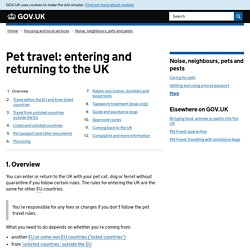
The rules for entering the UK are the same for other EU countries. You’re responsible for any fees or charges if you don’t follow the pet travel rules. What you need to do depends on whether you’re coming from: Your pet has to travel within 5 days of you, or someone else you’ve authorised (this must be in writing). If no one can travel within 5 days of your pet, you must follow different rules. You may need additional information or documents to enter some countries with your pet - check with the country you’re travelling to. Travelling with more than 5 pets You can’t travel with more than 5 pets unless you’re attending or training for a competition, show, sporting event. All your pets must: Regulations on Importing Dogs and Cats into Cyprus. Information/Regulations on Importing Dogs and Cats The dogs/cats shall not be imported in Cyprus unless and the Veterinary Officer at the port/airport of import is provided with an Animal Health Certificate issued by a duly authorized Veterinary Officer of the Government of the exporting country attesting that the animals: 1.
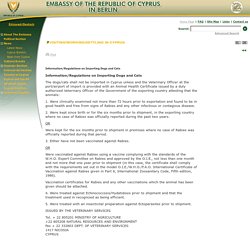
Were clinically examined not more than 72 hours prior to exportation and found to be in good health and free from signs of Rabies and any other infectious or contagious disease. 2. Were kept since birth or for the six months prior to shipment, in the exporting country where no case of Rabies was officially reported during the past two years. Were kept for the six months prior to shipment in premises where no case of Rabies was officially reported during that period. 3. Were vaccinated against Rabies using a vaccine complying with the standards of the W.H.O. 4. 5. Danish legislation on dogs. Amendments to the Danish Act on Dogs in 2014On June 11th 2014 the Danish Parliament adopted amendments to the Danish Act on Dogs.
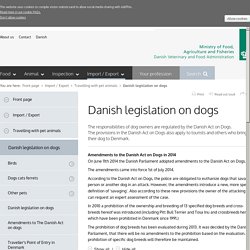
The amendments came into force 1st of July 2014. According to the Danish Act on Dogs, the police are obligated to euthanize dogs that savage a person or another dog in an attack. However, the amendments introduce a new, more specific definition of ‘savaging’. Also according to these new provisions the owner of the attacking dog can request an expert assessment of the case. In 2010 a prohibition of the ownership and breeding of 13 specified dog breeds and cross-breeds hereof was introduced (including Pitt Bull Terrier and Tosa Inu and crossbreeds hereof which have been prohibited in Denmark since 1991.) The prohibition of dog breeds has been evaluated during 2013.
Sections 1 a – b of the Danish Act on Dogs prohibit the keeping and breeding of 13 specified dog breeds, including crossbreeds involving the 13 specified dog breeds. Last Modified 19. Dänischen Veterinärverwaltung: Import and Export. The Danish Veterinary and Food Administration, International Trade Division deals with: Control of trade, including the import and export of live animals, semen, eggs, embryos, foodstuffs and non-food products, Travel with pet animals, Border control, Export certificates, TRACES ContentTop Commercial trade of pet animals Rules on commercial trade of pet animals.
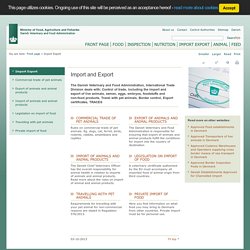
Eg. dogs, cat, ferret, birds, rodents, rabbits, amphibians and reptiles. Finnischen Veterinärverwaltung: personal imports. Animal diseases and harmful organisms can be rapidly spread through the international movements of live animals, foodstuffs, plants and products of animal and plant origin.
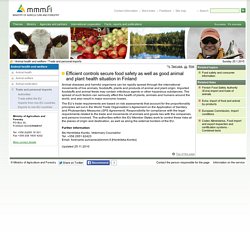
Imported foodstuffs and animal feeds may contain infectious agents or other hazardous substances. The spread of such factors can seriously affect the health of plants, animals and humans around the world, and also result in major economic losses. The EU’s trade requirements are based on risk assessments that account for the proportionality principles set out in the World Trade Organisation’s Agreement on the Application of Sanitary and Phytosanitary Measures (SPS Agreement).
Responsibility for compliance with the legal requirements related to the trade and movements of animals and goods lies with the companies and persons involved. Französischen Veterinärverwaltung: Animaux de compagnie. En France, aujourd’hui, près de deux foyers sur trois possèdent un animal de compagnie et on estime à plus de 18 millions le nombre de chiens et de chats.
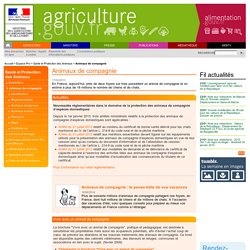
Actualités Nouveautés réglementaires dans le domaine de la protection des animaux de compagnie d’espèces domestiques Depuis le 1er janvier 2013, trois arrêtés ministériels relatifs à la protection des animaux de compagnie d’espèces domestiques sont applicables : Plus d’information sur cette règlementation Animaux de compagnie : le pense-bête de vos vacances Plus de soixante millions d’animaux de compagnie partagent nos foyers, en France, dont huit millions de chiens et dix millions de chats. Vivre avec un animal de compagnie La brochure "Vivre avec un animal de compagnie", pratique et pédagogique, est destinée à sensibiliser les propriétaires mais aussi les acquéreurs potentiels, afin d’éviter l’achat coup de cœur, de prévenir les abandons et les mauvais traitements des animaux de compagnie.
Irischen Landwirtschaftsministerium: Animal identification & movement. Maltesischen Veterinärverwaltung: Pet Animals entering Malta. Norwegischen Veterinärverwaltung. Schwedischen Veterinärverwaltung.